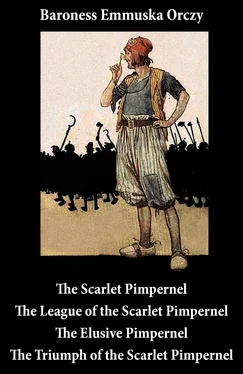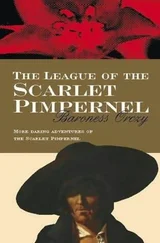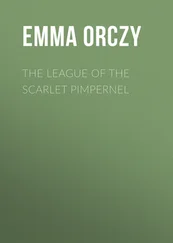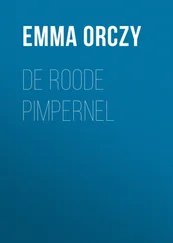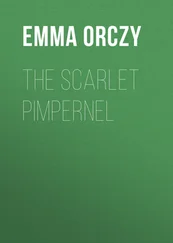A discreet knock at the door roused her from her enjoyment.
"Come in," she said with some impatience, without turning to look at the intruder.
Chauvelin, waiting for his opportunity, noted that she was alone, and now, without pausing for that impatient "Come in," he quietly slipped into the box, and the next moment was standing behind Marguerite's chair.
"A word with you, citoyenne," he said quietly.
Marguerite turned quickly, in alarm, which was not altogether feigned.
"Lud, man! you frightened me," she said with a forced little laugh, "your presence is entirely inopportune. I want to listen to Gluck, and have no mind for talking."
"But this is my only opportunity," he said, as quietly, and without waiting for permission, he drew a chair close behind her—so close that he could whisper in her ear, without disturbing the audience, and without being seen, in the dark background of the box. "This is my only opportunity," he repeated, as she vouchsafed him no reply, "Lady Blakeney is always so surrounded, so FETED by her court, that a mere old friend has but very little chance."
"Faith, man!" she said impatiently, "you must seek for another opportunity then. I am going to Lord Grenville's ball to-night after the opera. So are you, probably. I'll give you five minutes then. . . ."
"Three minutes in the privacy of this box are quite sufficient for me," he rejoined placidly, "and I think that you will be wise to listen to me, Citoyenne St. Just."
Marguerite instinctively shivered. Chauvelin had not raised his voice above a whisper; he was now quietly taking a pinch of snuff, yet there was something in his attitude, something in those pale, foxy eyes, which seemed to freeze the blood in her veins, as would the sight of some deadly hitherto unguessed peril. "Is that a threat, citoyen?" she asked at last.
"Nay, fair lady," he said gallantly, "only an arrow shot into the air."
He paused a moment, like a cat which sees a mouse running heedlessly by, ready to spring, yet waiting with that feline sense of enjoyment of mischief about to be done. Then he said quietly—
"Your brother, St. Just, is in peril."
Not a muscle moved in the beautiful face before him. He could only see it in profile, for Marguerite seemed to be watching the stage intently, but Chauvelin was a keen observer; he noticed the sudden rigidity of the eyes, the hardening of the mouth, the sharp, almost paralysed tension of the beautiful, graceful figure.
"Lud, then," she said with affected merriment, "since 'tis one of your imaginary plots, you'd best go back to your own seat and leave me enjoy the music."
And with her hand she began to beat time nervously against the cushion of the box. Selina Storace was singing the "Che faro" to an audience that hung spellbound upon the prima donna's lips. Chauvelin did not move from his seat; he quietly watched that tiny nervous hand, the only indication that his shaft had indeed struck home.
"Well?" she said suddenly and irrelevantly, and with the same feigned unconcern.
"Well, citoyenne?" he rejoined placidly.
"About my brother?"
"I have news of him for you which, I think, will interest you, but first let me explain. . . . May I?"
The question was unnecessary. He felt, though Marguerite still held her head steadily averted from him, that her every nerve was strained to hear what he had to say.
"The other day, citoyenne," he said, "I asked for your help. . . . France needed it, and I thought I could rely on you, but you gave me your answer. . . . Since then the exigencies of my own affairs and your own social duties have kept up apart . . . although many things have happened. . . ."
"To the point, I pray you, citoyen," she said lightly; "the music is entrancing, and the audience will get impatient of your talk."
"One moment, citoyenne. The day on which I had the honour of meeting you at Dover, and less than an hour after I had your final answer, I obtained possession of some papers, which revealed another of those subtle schemes for the escape of a batch of French aristocrats—that traitor de Tournay amongst others—all organized by that arch-meddler, the Scarlet Pimpernel. Some of the threads, too, of this mysterious organization have come into my hands, but not all, and I want you—nay! you MUST help me to gather them together."
Marguerite seemed to have listened to him with marked impatience; she now shrugged her shoulders and said gaily—
"Bah! man. Have I not already told you that I care nought about your schemes or about the Scarlet Pimpernel. And had you not spoken about my brother . . ."
"A little patience, I entreat, citoyenne," he continued imperturbably. "Two gentlemen, Lord Antony Dewhurst and Sir Andrew Ffoulkes were at 'The Fisherman's Rest' at Dover that same night."
"I know. I saw them there."
"They were already known to my spies as members of that accursed league. It was Sir Andrew Ffoulkes who escorted the Comtesse de Tournay and her children across the Channel. When the two young men were alone, my spies forced their way into the coffee-room of the inn, gagged and pinioned the two gallants, seized their papers, and brought them to me."
In a moment she had guessed the danger. Papers? . . . Had Armand been imprudent? . . . The very thought struck her with nameless terror. Still she would not let this man see that she feared; she laughed gaily and lightly.
"Faith! and your impudence pases belief," she said merrily. "Robbery and violence!—in England!—in a crowded inn! Your men might have been caught in the act!"
"What if they had? They are children of France, and have been trained by your humble servant. Had they been caught they would have gone to jail, or even to the gallows, without a word of protest or indiscretion; at any rate it was well worth the risk. A crowded inn is safer for these little operations than you think, and my men have experience."
"Well? And those papers?" she asked carelessly.
"Unfortunately, though they have given me cognisance of certain names . . . certain movements . . . enough, I think, to thwart their projected COUP for the moment, it would only be for the moment, and still leaves me in ignorance of the identity of the Scarlet Pimpernel.
"La! my friend," she said, with the same assumed flippancy of manner, "then you are where you were before, aren't you? and you can let me enjoy the last strophe of the ARIA. Faith!" she added, ostentatiously smothering an imaginary yawn, "had you not spoken about my brother . . ."
"I am coming to him now, citoyenne. Among the papers there was a letter to Sir Andrew Ffoulkes, written by your brother, St. Just."
"Well? And?"
"That letter shows him to be not only in sympathy with the enemies of France, but actually a helper, if not a member, of the League of the Scarlet Pimpernel."
The blow had been struck at last. All along, Marguerite had been expecting it; she would not show fear, she was determined to seem unconcerned, flippant even. She wished, when the shock came, to be prepared for it, to have all her wits about her—those wits which had been nicknamed the keenest in Europe. Even now she did not flinch. She knew that Chauvelin had spoken the truth; the man was too earnest, too blindly devoted to the misguided cause he had at heart, too proud of his countrymen, of those makers of revolutions, to stoop to low, purposeless falsehoods.
That letter of Armand's—foolish, imprudent Armand—was in Chauvelin's hands. Marguerite knew that as if she had seen the letter with her own eyes; and Chauvelin would hold that letter for purposes of his own, until it suited him to destroy it or to make use of it against Armand. All that she knew, and yet she continued to laugh more gaily, more loudly than she had done before.
"La, man!" she said, speaking over her shoulder and looking him full and squarely in the face, "did I not say it was some imaginary plot. . . . Armand in league with that enigmatic Scarlet Pimpernel! . . . Armand busy helping those French aristocrats whom he despises! . . . Faith, the tale does infinite credit to your imagination!"
Читать дальше
